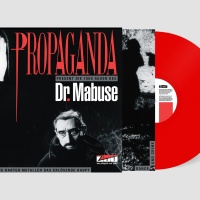Ultravox – Ingenuity | 1994 – 3
No sooner had the dust cleared on the “Revelation” album than news surfaced of yet another, completely new lineup! The next calendar year brought forth Ultravox [Mk IV for anyone counting] and this time it was a real band instead of Currie and a vocalist sharing all duties with a production maven. The group lineup dates from 1993, so Ultravox Mk III apparently crashed and burned before their sole album was issued. These gents all looked a good generation younger than Currie, but they add spice to the program and a sense of liveliness that was missing from the “Revelation” album [not to mention the “UVOX” album as well]. Key personnel were vocalist Sam Blue and guitarist Vinnie Burns. Writing credits, tellingly, were shared between all band members as Ultravox.
Intrigued at yet another form of this band, I put it on and was immediately rewarded when the elegant title cut came issuing out of the speakers. It starts with pulsing bass sequencers as Currie adds string patches as lightly as an airbrush to the proceedings. The synth leads are now Korg products, lending the sound a different coloration than with vintage Vox. Sam Blue was a huge leap forward as a vocalist from Tony Fenelle. He hits closer to the Midge Ure mark while actually sounding more like King Crimson’s John Wetton to these ears. Far more enjoyable than than Fenelle’s whiff of Richard Page [Mr. Mister]. The title cut was the best thing I’d heard with the Ultravox name attached to it since “White China.” Things were looking up!
“There Goes A Beautiful World” was another winner with a vivacious guitar line cutting a swath through the animated number. It proffers a livelier pace than did the languid title cut and one os left with the thought that this could work out rather well if they can consistently pull it off.
Currie’s viola makes an appearance on the third track “Give It All Back” to excellent effect. It slows the pace slightly from the preceding track and compensates by enhancing the riffage inherent in the track. In fact, one thing I must say about this version of Ultravox is that they have mastered the pitfalls inherent in writing and arranging that most difficult of numbers, the dreaded mid-tempo ballad. “Future Picture Forever” in other hands could be a snooze in the hammock but they make sure that when the tempo slows, that their melodies are strong and durable enough to support the loss of energy. Having prominent viola doesn’t hurt a bit, either.
There are four of what I’d typify as mid-tempo ballads on this album and they are all memorable tracks that use the considerable talent at hand to make sure that other elements of the song and performance rise above any loss of collective energy due to the tempo. Variation in instrumental and vocal attack coupled with inventive and lively arrangements shows that this band are perhaps even smarter than Ultravox Mk II in this regard.
“Distance” could have been a dull, plodding Ultravox mistake, but the tempo of the song is moderated to begin slow, speed up to climax at the middle eight and return from whence it came for the coda. Again, the melodies used are strong enough to withstand this sort of treatment and a track that would have bored in lesser hands ends up being a memorable and valuable addition to the overall program.
Most of the drumming on this album doesn’t attempt to walk the Warren Cann walk in any way, but the pacing of two numbers [“The Silent Cries” and “A Way Out. A Way Through.”] do trade in the distinctive Ultravox urgency ála “Dancing With Tears In My Eyes” with the Vinny Burns’ guitar riffs in the former and pulsing bass sequencers in the latter giving these tracks a bit more “familiarity” shall we say, even as drummer Tony Holmes studiously avoids the Klaus Dinger beat. Bravo!
“Ideals” benefits from a buoyant arrangement that sees a galloping beat seasoned with Currie’s elegant piano trading space with Burns’ vibrant, stinging guitar leads. They almost save the best for last as the album concludes with Ultravox’s first instrumental since “Astradyne.” “Majestic” more than lives up to its name with throbbing bass liberally spiced with Currie’s streamlined organ leads making for a classic Ultravox instrumental that satisfies deeply. At 4:18 it seems like a tease.
I was tremendously impressed with this album, given the contemporary context of ultimately dissatisfying Ultravox albums since 1982, really. The passage of nearly 20 years has done nothing to diminish its honest and considerable achievements. Here’s a telling example of its strengths. Almost all of the album’s songs are 4:20 in length and the material is so good, paced so carefully, and arranged with such flair that this goes unnoticed when playing it! I can’t tell how many albums I have where the maker’s fell prey to the 4:20 syndrome, and when the material and arrangement is wanting, brother, that can be very tough going! This album glides by with no effort called upon the listener to meet the band anything but halfway.
This album more than passes the recall test. Can I pick up the CD case, and when reading the titles, remember what each of the songs sounds like in my head? Absolutely! No mean feat when you have thousands of CDs like I do! Unfortunately, this lineup of the band met with commercial indifference in the face of dreadful 90s grunge and techno. The oasis of sound they provided me with was regrettably short lived. With one exception.
Next: That exception…








![Chris Cross: 1952-2024 [part 2]](https://postpunkmonk.files.wordpress.com/2024/04/ultravox-cross.jpg?w=200&h=200&crop=1)



I downloaded this a few year’s back but don’t remember too much…I can recall the chorus of the title track, and I remember the instrumental being pretty good, but that’s it. I’ll give it another listen and let you know what I think.
LikeLike
I defintely prefer Ingenuity to Revelation. Yes the singing is better – I get the John Wetton reference and in most contexts that would not be such a good thing, but it works with the songs – he even has a bit of a Prog Rocker look in the press pics. Majestic is actually pretty stunning. There Goes A Beautiful World feels very much like Lament era Ultavox with updated synths. The title track feels a bit like it’s a look back at Vienna Era New Romanticism. I also hear a bit of Iva Davies/Icehouse in the song as well…now there would have been a possibly genius or disasterous musical hook up – one which I would have loved to hear, regardless…
LikeLike
Echorich – Yes! You’ve suggested a canny comparison that I’ve not previously entertained, but certainly I see what you suggest. The Icehouse Factor®! Sam Blue lends some of this material a subtle Iva Davies feel. There’s nothing overblown about his singing, he’s more subdued. More like Davies than Ure in that regard. Ure pushes more. Blue is content to let the music do the “talking.” You just know Iva was a fan, though I’ve never heard as such. He certainly had his “UVOX” moment with “Code Blue” but why not go for broke and suggest that Currie should have bagged Davies for lead singer duties in Ultravox Mk IV! I say it’s so crazy it might have worked!
Re: their prog roots are showing… I was aware that Vinny Burns came to this project directly from a tour with Asia for their “Aqua” album, but since he never recorded with the band, I let it slide. I just researched the entire history of Asia [I only had knowledge of their first two albums] and it’s a pretty seriously inbred little gene pool that they have there! That first Asia album was so toxic, I gave it away after a single slack jawed listen! Obviously, millions disagreed.
LikeLike
Prog is an insideous genre that constantly tries to reinvent itself and pull in sounds and musicians from other, more interesting genres. Look and Richard Barbieri of Japan and his stint in Porcupine Tree…basically dreck in my mind. Prog fans like to think that Krautrock is part of Prog…I sincerely disagree! Krautrock is it’s own animal and gave birth to an era of experimental and electronic music which is far from Prog. I could go on and on, but will save your eyes here…
As for Iva Davies, a musical giant in my mind, yes all Giants trip and fall, hard, but his body of work, especially with Rob Kretschmer is so very strong and era defining. In an era when Big Music was the way to success, Icehouse took a Big Music sound and layered it made more complex than their contemporaries. With that I’m off to listen to Measure For Measure…
LikeLike
Echorich – I think that there were perceived links between Krautrock and Prog, due to the emphasis on keyboards, albeit in very different ways. I agree with your thesis. Krautrock had almost nothing to do with Prog but much to do with Post-Punk. I’d go as far as saying, that Punk was like a mutant boil that killed off prog before it was lanced, resulting in the re-emergence of the seeds of Krautrock in the form of Post-Punk. Look at it as this form of continuity. Here is the thesis. Prog was the apotheosis of technique [form] over content. Content in Prog was negligible. What the hell were Yes albums about? Its form was technique, and technique alone. At a certain point, the antithesis of technique, Punk, manifests itself due to a yawning need in the musical zeitgeist. Punk was low in form but high in content. As Hegel would have it in his dialectic, the unity of thesis and antithesis results in a synthesis. New Wave was the synthesis of Punk and Prog with renewed emphasis on content coupled with a scaling back of form to more manageable levels as laid out in Krautrock, which was almost systems music, when you come right down to it.
With so many genres of music, I still have a hard time defining them, 40 years later! Prog, glam, new romantic… can anyone really define them, even now?
LikeLike
Your thesis has legs, very long and strong legs…The synthesis results in albums like Magazine’s Real Life, as well as, Real To Real Cacophony and Empires and Dance by SImple Minds for example.
Prog does lurk in and around a lot of the music I grew up on pre Punk. The Art Rockers and Glam Rockers that I loved flirted with Prog certainly. Luckily Eno and Bowie found some magic in Berlin. Roxy Music flirted with technique over content but never let it get in the way of a good pop song.
As for the multitude of genres, my trainspotting side loves it, my disorganized and organic side throws it’s hands up…
LikeLike
Echorich – Astute on the Roxy Music. They were right up there with Kraftwerk in influencing all of my favorites. I think they were more influential, musically, than Bowie. I think Bowie influenced more the marketing of personality [vis-a-vis creating personae like Ziggy Stardust] than with his sounds, per se. At least until Berlin, where he hit a rich, Roxy-like vein, not unsurprisingly, with Eno in tow.
LikeLike